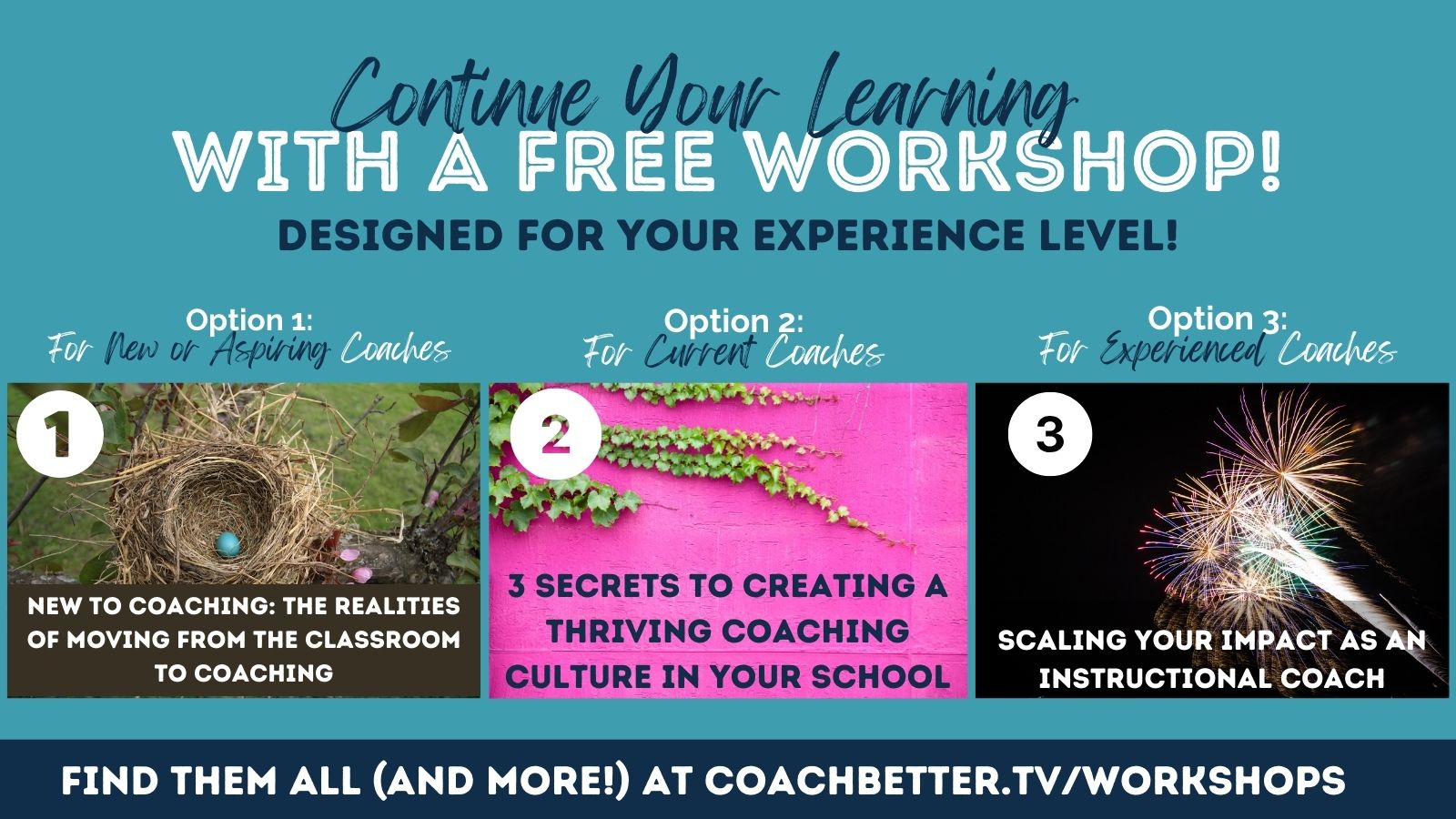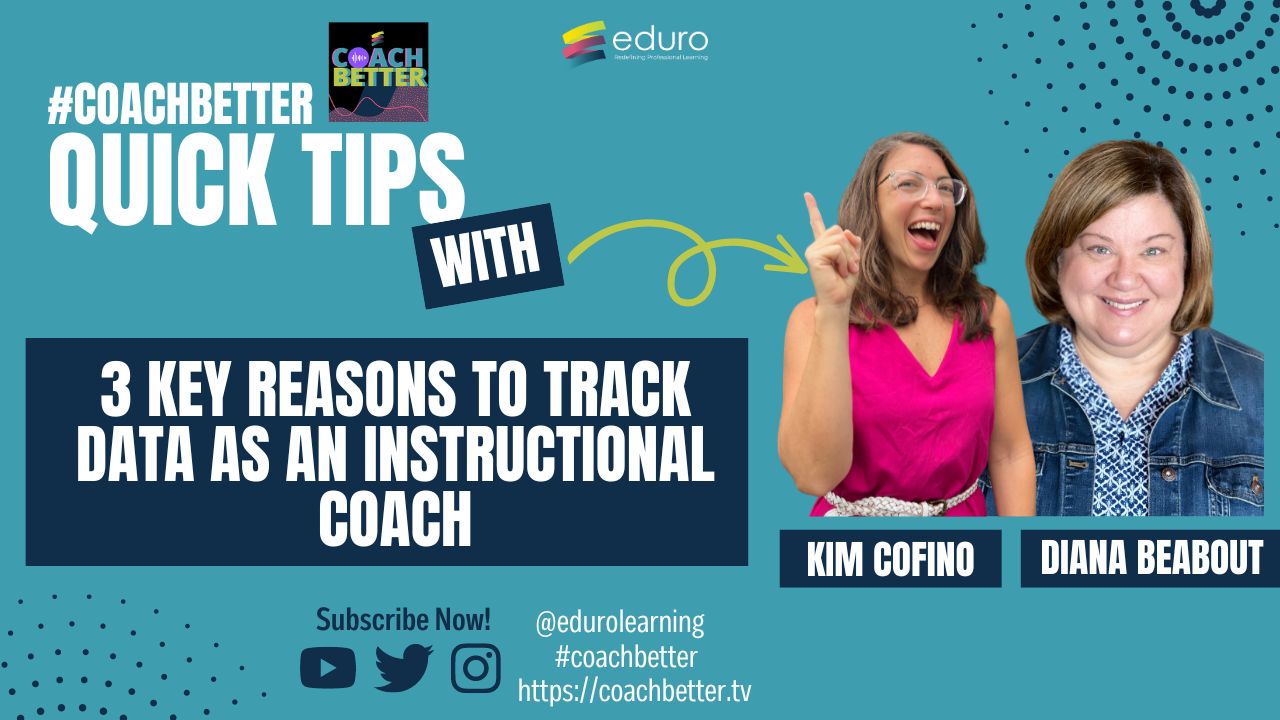It’s almost the end of the school year, and we know that this time is even busier than the rest of the year.
But, even though it’s busy, we need to make sure we take time to pause for reflection.
Just like we need to remember to get a post-classroom-visit coaching conversation scheduled, we also need to be intentional about reflecting on our own practice as coaches.
As coaches, we know, there is no learning without reflection.
John Dewey says ‘We do not learn from experience… we learn from reflecting on experience.’
If we are continually asking our coaching partners to stop and reflect, and they ask their students to do it, we already deeply understand the value of this process.
This is the same reason we need to stop and reflect as coaches.
We’re sharing 3 key reasons to track data as a coach along with some questions you might want to ask yourself as you go through this process.
1: To Look Back
It’s important to look back to see if you’ve achieved your goals, to see how you’ve supported your colleagues, to see where your time and energy has gone, and to better understand your impact.
Some questions you might want to ask yourself are:
- How did you document your coaching this year?
- What did you uncover? What did you learn? What do you know now?
- What impact did you make? Does this align with the expectations for your role? (this is why you need clarity)
- How does the data you uncovered align with the school goals / priorities?
- What could you have captured that maybe you didn’t? What do you need to adjust / refine for the year ahead?
- How can this information help you plan for next year?
Once we stop and reflect, the next step is to take action based on what we’ve learned. Peter Drucker says: “Follow effective action with quiet reflection. From the quiet reflection will come even more effective action.” Combining your reflection process with intentionally planning can help ensure that you move forward in the direction you want (rather than just continuing what you did the year before). This is exactly the continuous growth process we are advocating for in our work as instructional coaches.
What’s YOUR level of coaching mastery?
All coaches go through various stages of coaching mastery. Once you identify where you’re at, you can begin to build the skills needed to move to the next stage.
This quiz is based on real-life case studies compiled from years of working with coaches inside The Coach Certificate & Mentorship Program!
When you receive your results, you’ll also get your matching case study from the STRIVE Case Studies to see where you fit in the stages of coaching mastery.
Ready to tackle your challenges and move on to the next level in YOUR coaching practice?

The STRIVE Model of Coaching Mastery quiz will help you identify your level of coaching mastery by matching you with case studies compiled from years of working with coaches inside The Coach Certificate & Mentorship Program so you can easily see where you fit!
When you complete the quiz, you’ll get:
- Your matching case study,
- Specific strengths & challenges aligned to your result;
- Suggested next steps for each stage;
Plus the Case Study Document includes:
- Case studies leveled by coaching mastery;
- A framework to identify essential stages of professional growth & key areas to focus on in your professional learning;
- Alignment with the THRIVE Model for a Successful Coaching Culture;
- Space for you to reflect & prioritize so you can take action immediately!
You’ll go straight to the Quiz, and get the Case Studies by email.
2: To Look Ahead
We need to look ahead to identify what needs to be adjusted in the next academic year – in terms of your practice and what you measure about your practice, to set goals, and to be intentional about how you measure the impact of your coaching practice, to help you decide how to spend your energy and time (what to say yes (or no) to in the following year), to set yourself up for success.
Some questions you might want to ask:
- How can the information you gathered last year & your reflection help you set your goals for the next year?
- How do your intentions for next year align with the school goals & vision?
- What adjustments do you need to make to your practice to better meet your goals / school goals or align with role expectations?
- What adjustments do you need to make to the way you collect evidence to better measure your impact
- When, and how often, are you going to collect information about your practice? (Needs Assessment, Feedback survey, regular input from coaching partners – how often, asking the same questions to compare)
- How are you going to collect this evidence? Survey – who to seek feedback from / what to ask
- How are you measuring your time? (to help admin understand what you do & why it’s important)
Setting intentional goals based on reflection means that we are using data to guide our decision making. Informed decision making ensures that our time spent as coaches is moving us in the direction we need to go, and keeps our work aligned with school vision and mission. Without data to guide decisions, we are just guessing.
3: To Share & Connect
It’s important to remember that coaching is not taking place in a bubble, you need to be intentional in communicating how coaching is supporting the vision and mission of the school.
Sharing is essential:
- to make connections for other stakeholders,
- to celebrate successes, to validate your role, to build community and enthusiasm around coaching,
- to recognize the work of your coaching partners,
- AND to be intentional about who you reach out to in the next academic year
Some questions you might want to ask:
- What connections can you make between the work you & your coaching partners did and student learning outcomes?
- What successes can you build on for the following academic year?
- How can you be more intentional about sharing the data over the next academic year within the school (school leaders, parents, teachers, etc)?
There’s no “one right way” to do this, the process is never done, it’s ongoing and always being refined. It’s important to not only be reflective about the information you gather, but also about the process. As you’re wrapping up this academic year, we’d like to invite you to consider the ways that you reflect on your coaching practice, set intentions for the following year, and how you share those insights with your school community.
We hope these 3 key reasons to track data as a coach, along with some questions you might want to ask yourself as you go through this process, is helpful for you as you are winding down your academic year.
Watch the Video
Keep Learning
If you’re ready to dig deeper into being more intentional in your coaching practice – or if you’re new to instructional coaching and you’re curious about getting started, join us for one of our courses for coaches!
We have programs to support you in every stage in your journey. From new coaches moving from the classroom to a coaching role; to current coaches ready to be more intentional and strategic in their practice, to experienced coaches, ready to lead. Find them all at coachbetter.tv/learn
Free Workshops for Instructional Coaches
If you’re ready to keep learning, try one of our FREE workshops where you’ll be able to dig deeper into the concepts in this post, and get a peek at all of our courses for coaches.
We have workshops (and courses) to support coaches at every stage of their career: from new and aspiring coaches making the move from classroom to coach; to current coaches ready to be more intentional and strategic in their practice; to established coaches leveraging their coaching experience to lead.

You can them all on our coachbetter website at coachbetter.tv/workshops
If you’re curious right now, you have questions, please reach out. You can leave a comment below, join our #coachbetter Facebook group, or find us on social media at Eduro Learning and send me a DM. I’d love to support you on your coaching journey. See you next time!
Connect with us!
Subscribe to the podcast iTunes |Spotify|Stitcher
Follow us on social media: Instagram |LinkedIn
Join our #coachbetter Facebook group

Recent Comments